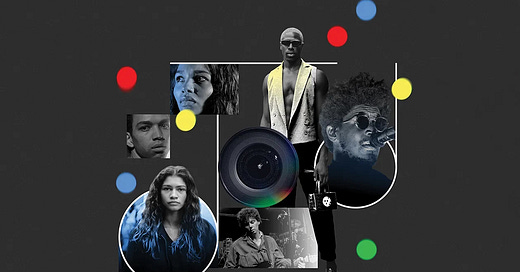🔴 F*ck data! 💻
Eerlijk is eerlijk: de oogst was de laatste weken mager. Het was schrapen, leek eb qua heet nieuws voor de Nielsbrief. Vandaag maak ik dat in 1 klap goed met 4 leuke, must-read items.
In deze editie:
1. Hoe muziek ‘gratis’ werd: Eminem maakte er een docu over.
2. Hoe de hipste filmproducent met succes de hipste muziek inzet.
3. Must-read waarom arena-tours in Amerika grandioos falen (The Black Keys! 😵)
4. F*ck data!
1. Een stuk controversiële muziekgeschiedenis
The Guardian interviewt de makers van How Music Got Free, een door Eminem geproduceerde documentaire over wat de muziekindustrie overkwam toen Shawn Fanning Napster introduceerde. Daar kon je al een uitstekend boek over lezen (Appetite for Self-Destruction1), maar kan me zo voorstellen dat sommige mensen liever naar een stel pratende koppen kijken dan naar letters op papier (tip van Hans):
“We need to ask ourselves what we can learn from our past to figure out how to co-exist with technology and use it to our advantage,” [director Alex Stapleton] said. “Rather than relying on the biggest industries to tell us the answers to those questions, we should be looking in the nooks and crannies of culture to discover the answers for ourselves.”
Om je op te verheugen: in de vierde aflevering van Blauwe M&M’s blikken diverse Nederlandse industrie-kopstukken terug op de harde val van CD-boom naar MP3-crash. Wat een bloedbad… 🩸 Nu al te horen op NPO Luister, volgende week op Spotify. Daar staat sinds vanmorgen afl. 3 van S3, over Radiohead, The Police, Lady Gaga in Amsterdam, de drummer van Def Leppard die halverwege een albumopname zijn arm verloor en de studiowensen van Elton John. Luister:
2. Film ❤️ muziek (en da’s wederzijds)
Het is zonder twijfel VPRO Flowerboy’s favoriete filmdistributeur: A24, de producent die sinds 2012 met een lastig samen te vatten visie heel herkenbare films met succes op de markt brengt. Geen superhelden-blockbusters in eindeloze vervolgseries, maar ogenschijnlijk verrassende kaskrakers met vaak een ‘arthouse-gevoel’. A24 blijkt ook heel bewust muziekbeleid te voeren. Billboard schreef er een heerlijk achtergrondartikel over:
“We like to believe that life is short and art is long, but here, it is really happening.”
3. Hét artikel van deze week
Hier is over nagedacht: eerst twee leuke, laagdrempelige voorgerechten alvorens ik de hoofdmaaltijd van deze week serveer… 🍽️
Ik trapte deze Nielsbrief af met een historische docu over de donkere tijden van de muziekindustrie, maar die zijn al even voorbij. Dankzij streaming komt bij labels het geld door de plinten naar binnen en ook ‘s werelds grootste promoter Live Nation/Ticketmaster maakt jaar na jaar mooiere cijfers bekend. In een bere-interessante podcast die ik hier al vaker deelde vertelt eindbaas Michael Rapino hoorbaar met een glimlach hoe Live Nation/Ticketmaster successen boekt:
Maar het is niet allemaal goud wat er blinkt… Aan de overkant van de plas werden de afgelopen weken grote stadiontours plotseling afgelast. Meest in het oog springende slachtoffers: J.Lo en The Black Keys. Wat is daar aan de hand? Stereogum duikt erin en schetst in een uitstekend stuk een aantal oorzaken en scenario’s. Must-read, zelfs al verschilt de US livemarkt op essentiële punten van de Europese situatie:
“There’s certain agents that have a track record of just kinda killing bands,” the agent adds. “They fire the agents at a smaller agency, it goes to a bigger agency, and they just cram it down the throat of these promoters, and there’s a frenzy in the promoter game. Everyone wants a piece of it, and the tour deals get more and more aggressive. Then they price the tickets too high and they just don’t sell.”
“Essentially, you have some very big managers that are out of touch with the granular finesse and nuance of ticketing,” says another anonymous booking agent. “And they have these large expectations and they tell their agents what they want. And the agents are probably texting each other on the side, going, ‘This man is out of his f*cking mind.’ But they do it anyway because, in the case of Black Keys, they’re not gonna challenge Irving Azoff.”
En ook aan de overkant van Het Kanaal vallen spaanders: 40+ (!) onafhankelijke Britse festivals zijn inmiddels omgevallen en daar blijft het niet bij, aldus vakblad IQ:

4. Dit wil ik graag geloven
Het gaat al jaren over data en recenter de rol van AI in de muziekindustrie. Technologie bepaalt meer en meer beleid, succes of mislukkingen in de moderne muziekindustrie. Toch blijf ik een romanticus, wil graag geloven in de onvervangbaarheid van het menselijk oor. Deze post las ik dan ook instemmend (al vrees ik dat AI en algoritmes (snel) meer kunnen dan hoe ze hier worden weggezet…):
Data can just show you what people are already listening to. An algorithm can’t point you towards interesting art because it has no concept of ‘interesting’ or ‘art’.
An algorithm’s “curation” is always just a random succession of superficially pleasant, non-intrusive sounds. While it can surely compile a bunch of songs that share a vague similarity to what you have already listened to and not skipped, there are still enough listeners that long to be surprised, and expand their horizon. […]
Tech execs say they’re all about eliminating gatekeepers. Sounds great on paper, right? But they’ve installed new ones – and they’ve replaced the old ones with the shallow metrics of popularity: streamcounts, monthly listeners, skip rates, save rates, what-have-you rates.
This is not how you move culture forward. […]
Our numbers obsession has already killed music journalism, now it’s slowly killing music itself.
Hier had je AI en algoritmes niet voor nodig: met nieuwe albums van Taylor Swift, Beyoncé, Ariana Grande, Dua Lipa, Kacey Musgraves, Billie Eilish en zelfs Jennifer Lopez leken we af te stevenen op de Lente Der Popprinsessen. The Wall Street Journal maakt halverwege het jaar de balans op en concludeert:
As it turns out, “Pop Girl Spring” — as some called it — has ended up… kind of meh.
[…] The string of pop flops is the latest evidence of how difficult it has become for the music business to generate the kinds of genuine moments that turbocharge sales and move the cultural needle, music executives say.
Gelukkig is daar Charli XCX, heerlijk scherpe popplaat:
Dat was het voor deze week. Tot de volgende Nielsbrief. Die zal niet komende maandag in je inbox zitten, want dan rijd ik terug uit Landgraaf.
Groet,
Niels
Wie zich serieus wil verdiepen in de geschiedenis van de muziekindustrie leze eerst Hit Men - Power Brokers & Fast Money Inside the Music Business en aansluitend Appetite for Self-Destruction. Die twee zeer smakelijke boeken vol anekdotes schetsen samen een vrij compleet beeld. Het eerste beslaat het ontstaan van muziek als winstgevende business vanaf eind jaren ‘40 van de vorige eeuw tot pakweg begin jaren ‘90, vlak voor de laatste grote hausse dankzij Britney Spears, The Backstreet Boys, N*Sync, The Spice Girls en andere boy- en girlbands. Appetite for Self-Destruction sluit daarop aan en beschrijft pakkend hoe Napster, Limewire, Oink, The Pirate Bay en andere MP3-uitwisseldiensten aan het begin van deze eeuw de muziekindustrie bijna te gronde richtten. Juicy! 🤤






How music got free is zelfs een eigen (erg vermakelijk) boek